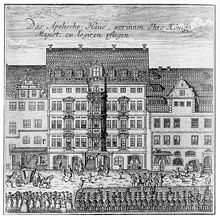Preise dein Glücke, gesegnetes Sachsen, BWV 215
|
Preise dein Glücke, gesegnetes Sachsen BWV 215 |
|
|---|---|
| Dramma per musica by J. S. Bach | |

Palace of the Elector in Leipzig
|
|
| Related | base for Osanna of Mass in B minor |
| Occasion | Anniversary of the election of August III as King of Poland |
| Performed | 5 October 1734: Leipzig |
| Movements | 9 |
| Cantata text | Johann Christoph Clauder |
| Vocal | 2 SATB choirs and soloists |
| Instrumental | |
Preise dein Glücke, gesegnetes Sachsen (Praise your good fortune, blessed Saxony),BWV 215, is a secular cantata by Johann Sebastian Bach. He composed the cantata gratulatoria (congratulatory cantata) or Dramma per musica (drama in music) in Leipzig as a Festmusik für das kurfürstlich sächsische Haus (Festive music for the court of the Electorate of Saxony) for the anniversary of the election of August III, Elector of Saxony, as King of Poland, and first performed it on 5 October 1734 in the presence of the Elector.
The Neue Bach-Ausgabe has detailed background information about the events around the composition and first performance of the cantata, collected by Werner Neumann. August III, Elector of Saxony and of Poland, had announced his presence in Leipzig from 2 to 6 October 1734, on short notice. As the anniversary of his election as king on 5 October fell in this time, students of the University of Leipzig planned to perform a procession with torches and evening music on that day. The cantata text was written by Johann Christoph Clauder. He refers to the events of the last months. While other congratulatory cantatas often use allegorical figures, this work concentrates on the king and his qualities. When Augustus II the Strong died, August III followed him as both elector and king, but had to secure the throne against partisans of Stanisław I Leszczyński.
Bach composed the music, probably in no more than three days. He used the first movement of his 1732 cantata Es lebe der König, der Vater im Lande, BWV Anh 11, set for two four part choirs, as a base for the opening chorus. The former work had been composed in 1732 for the Namenstag (name day) of the previous elector August II. It seems likely that Bach also used other earlier music, but no specific pieces have been identified.
...
Wikipedia
